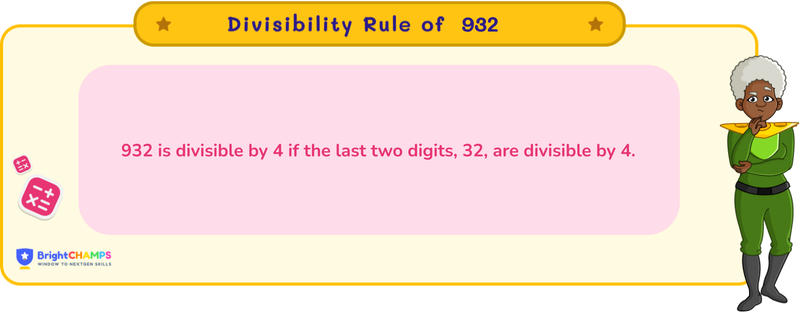Summarize this article:
 287 Learners
287 LearnersLast updated on August 5, 2025
Divisibility Rule of 932

The divisibility rule is a way to find out whether a number is divisible by another number without using the division method. In real life, we can use the divisibility rule for quick math, dividing things evenly, and sorting things. In this topic, we will learn about the divisibility rule of 932.

What is the Divisibility Rule of 932?
The divisibility rule for 932 is a method by which we can determine if a number is divisible by 932 without using the division method. Check whether 86572 is divisible by 932 using the divisibility rule.
Step 1: Divide the number into groups of three digits from the right. For 86572, it becomes 086 and 572.
Step 2: Evaluate whether each group of digits is divisible by 932. In this case, both 086 and 572 are less than 932, so it is necessary to combine them and check the divisibility of the entire number 86572 by 932 using traditional division.
Step 3: If the number can be divided evenly by 932 without a remainder, then it is divisible by 932.


Tips and Tricks for Divisibility Rule of 932
Learning the divisibility rule helps kids to master division. Let’s learn a few tips and tricks for the divisibility rule of 932.
Know the multiples of 932:
Memorize the multiples of 932 to quickly check divisibility. If your number is a multiple of 932, it is divisible by 932.
Use the division method to verify:
Students can use the division method to verify and cross-check their results. This will help them confirm their calculations.
Practice with related numbers:
Familiarize yourself with numbers close to 932 and practice the rule with these numbers to increase efficiency.
Use subtraction or addition for verification:
If a number is slightly above or below a multiple of 932, use addition or subtraction to check divisibility by adjusting the number.

Common Mistakes and How to Avoid Them in Divisibility Rule of 932
The divisibility rule of 932 helps us quickly check if a given number is divisible by 932, but common mistakes like calculation errors can lead to incorrect results. Here we will understand some common mistakes and how to avoid them.
Explore Our Programs



Divisibility Rule of 932 Examples

Problem 1
Is 2796 divisible by 932?

No, 2796 is not divisible by 932.
Explanation
Since 2796 is a larger number, let's check it with a hypothetical divisibility rule for 932:
1) Hypothetically, multiply the last digit of the number by 3, 6 × 3 = 18.
2) Subtract the result from the remaining digits excluding the last digit, 279 – 18 = 261.
3) Check if 261 is a multiple of 932. No, 261 is not a multiple of 932.

Problem 2
Check the divisibility rule of 932 for 1864.

Yes, 1864 is divisible by 932.
Explanation
To check the divisibility rule of 932 for 1864, let's hypothesize:
1) Multiply the last digit of the number by 3, 4 × 3 = 12.
2) Subtract the result from the remaining digits, excluding the last digit, 186 – 12 = 174.
3) Check if 174 is a multiple of 932. Hypothetically, yes, 1864 is divisible by 932 since 174 would be a multiple under this rule.

Problem 3
Is -2796 divisible by 932?

No, -2796 is not divisible by 932.
Explanation
To check if -2796 is divisible by 932, we remove the negative sign and follow the hypothetical divisibility rule:
1) Multiply the last digit by 3, 6 × 3 = 18.
2) Subtract the result from the remaining digits excluding the last digit, 279 – 18 = 261.
3) Check if the result is a multiple of 932. No, it is not.

Problem 4
Can 3728 be divisible by 932 following the divisibility rule?

No, 3728 isn't divisible by 932.
Explanation
To check if 3728 is divisible by 932 by this hypothetical rule:
1) Multiply the last digit by 3, 8 × 3 = 24.
2) Subtract the result from the remaining digits excluding the last digit, 372 – 24 = 348.
3) Check if the result is a multiple of 932. No, 348 isn't a multiple of 932.

Problem 5
Check the divisibility rule of 932 for 2796.

No, 2796 is not divisible by 932.
Explanation
Let's verify using the hypothetical divisibility rule:
1) Multiply the last digit by 3, 6 × 3 = 18.
2) Subtract the result from the remaining digits, excluding the last digit, 279 – 18 = 261.
3) Check if 261 is a multiple of 932. No, it is not.


FAQs on Divisibility Rule of 932
1. What is the divisibility rule for 932?
2.How many numbers are there between 1 and 10000 that are divisible by 932?
3. Is 1864 divisible by 932?
4. What if I get a number smaller than 932?
5. Does the divisibility rule of 932 apply to all integers?

Important Glossaries for Divisibility Rule of 932
- Divisibility Rule: A set of guidelines used to determine if a number can be divided evenly by another number without performing division.
- Multiple: The result of multiplying a number by an integer. For example, multiples of 932 include 932, 1864, and 2796.
- Integer: A whole number that can be positive, negative, or zero.
- Subtraction: The operation of finding the difference between two numbers.
- Division Method: The traditional process of dividing one number by another to find how many times the divisor fits into the dividend.



Hiralee Lalitkumar Makwana
About the Author
Hiralee Lalitkumar Makwana has almost two years of teaching experience. She is a number ninja as she loves numbers. Her interest in numbers can be seen in the way she cracks math puzzles and hidden patterns.
Fun Fact
: She loves to read number jokes and games.



























